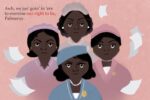There’s a certain purity about standard English that U.S. citizens like to safeguard. A crusade of self-entitled intellectuals take pride in correcting every little grammatical error under the guise of protecting language purity. God forbid, someone uses “your” instead of “you’re.” And if it’s “ur”? Well, hell hath no fury like a keyboard warrior in the face of internet shorthand.
It seems like the natural enemy of the keyboard warrior is anyone who uses slang, or in most cases, AAVE: African-American Vernacular English. AAVE (pronounced like “ah-vay”) has many names, the two most popular of which Black English or Ebonics.
“On fleek,” “shade” and “bae” are few AAVE terms that people often mistake as slang, but let’s make that distinction very clear: AAVE is not slang. Slang suggests that the word usage is informal or taboo language used between young people. It also suggests the language is of a lower standard. While AAVE can be taboo thanks to grammar perfectionists, it is not of lower standards.
AAVE is its own language. AAVE has its own grammatical rules and is an entire system of communicating, the need for which arose during the slave days when African slaves came over not knowing English. As the slaves started learning English, they developed a pidgin that combined the many cultures into a common language. The AAVE that is spoken today is not the same, but rather an evolution of language through the decades.
And not all AAVE is built the same, just as not all African Americans are not the same. Hell, not even all black people are the same. But not everyone even knows the difference between African American and black. It’s easy to see the world in absolutes, like generalizing all black people as a monolithic culture. Many Jamaicans, for example, do not see themselves as African American. Some Jamaicans aren’t descendants of American slaves, so they don’t define themselves as such.
Jamaicans also speak a different form of AAVE than other black peoples. The Weeknd’s “Starboy” talks about being a guy who flashes his wealth, which comes from Jamaican language, though the language has evolved from Starboy to “Kwenga.” Where Jamaicans might say starboy, African Americans might say “playa” instead. The words may mean the same, but they aren’t necessarily interchangeable. If you call Jay-Z a starboy to his face, he might look at you funny. If you call him a playa, however, you’ll probably get one of those weird hand slap and half hug things that men do in greeting. (Seriously, just hug. We know you’re not gay.)
The difference in language differs by region as well. Tip Harris, aka dirty south rapper T.I., explains as such in this clip from his movie “ATL,” where he briefly demonstrates the difference between city and country language. But the regional language difference isn’t confined to race. A white person from New England and a white person from California clearly speak differently than anyone in the U.S. Not only is the accent unalike, but when something cool happens a New Englander will say “Wicked cool,” while a Californian will say “Hella cool.”
There are so many factors that affect language besides region, from gender to class. Language, then, is completely made it up. It’s a social construct, just like how time isn’t real and we’re all going to die someday, so what’s the point? And while language is made up, it matters, but not in the way grammar perfectionists think.
Not only is standard English imperfect anyways, but the evolution and deviation of standard English is important to developing cultural identity.
Rihanna shows this in her song “Work.” Critics heard her lyrics and thought they were nonsense gibberish and lazy slurs. However, if critics weren’t lazy themselves and researched a little, they’d know that Rihanna wasn’t just saying whatever crazy words were off the top of her head.
Rather, she was speaking Jamaican patois, another language developed by slaves in order to communicate with one another. “Work,” from the patois to the hip twisting and leg grinding, is a homage to Jamaican dancehall culture where the island gal Rihanna takes inspiration for the majority of her music.
By deeming Rihanna less intelligent for using patois, grammar perfectionists are effectively calling for Rihanna to strip herself of her cultural identity in order to fit in to the standards of English. It’s like going to Japan, hearing the language and going “What the hell are these people speaking?” The same is true with all the other African Americans who use AAVE.
White people aren’t banned from using AAVE either, but knowing the cultural significance is very important in the process of not erasing it. Acknowledging that the language is not slang, and using it in the right context is what it boils down to. Because when white people only use AAVE to be funny or sound aggressive, they are inadvertently stereotyping African Americans as a joke or violent people. The quick evolution, however, that AAVE takes when white people effectively downgrade the language as slang goes to show how ingenuitive African Americans are.
So where does everyone go from here?
Well, the first step is to cut out language purity. Sorry not sorry to say this, but language is made-up and it’s always going to be imperfect. There is no ultimate language, and even if someone sends a message in smoke or emojis, as long as the receiver understands what is being communicated, it’s okay. Even in an academic setting, there should be more room for other languages. The same intelligent argument made in standard English is just as effective in AAVE.
The second step is to acknowledge the cultural significance and variety of language. By region, gender, class, race and more, language is always changing, and it’s important to expressing cultural identity.
Finally, let’s just enjoy ourselves. No one is superior for preferring one mode of communication over the other. Language shouldn’t be this imposing force with iron-clad rules and regulations hanging over everyone’s head. Language certainly has power, but it’s in those simple moments of sending your mom a “hello” text with a heart emoji, that language is still beautiful.
So, when posed with “To bae or not to bae?” you don’t have to bae, but you better let other people be.


















[…] Check out the article here. […]
[…] Check out the article here. […]
[…] that’s not a concept i should speak on, though; i’ll leave that discussion to black americans […]
Can I classify some words as African-American slang expressions by seeing the background of the culture? For example: Jordans (Nike Air Jordan shoes), African-Americans are famously known for being big fans of the shoes. Another example: line up (hair line). I can’t describe it very well but these two things are such big deals for African-Americans because it is concerned with style.
[…] Primary Material: https://studybreaks.com/2017/04/04/aave/ […]
[…] is a regular occurrence in modern American culture. Think through the slang words that young adults and teenagers use nowadays — AF, slay, finna, savage, tea, shade —and […]